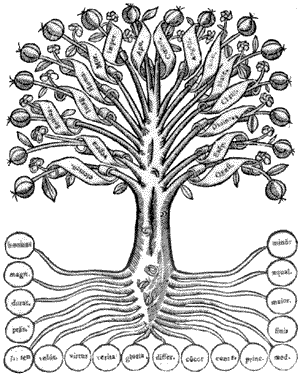VIDE: HyperHeidegger
VIDE: Dienlichkeit
service, utilité (ETEM)
serviceability (BTJS)
Dienlichkeit (e): serventia (GA5BD)
NT: Serviceability (Dienlichkeit), 68, 78, 82-84, 137, 144 (BTJS)
1. ‘Es hat den Charakter des Um-zu, seine bestimmte Dienlichkeit, es ist zum Zeigen.’ The verb ‘dienen’, is often followed by an infinitive construction introduced by the preposition ‘zu’. Similarly the English ‘serve’ can be followed by an infinitive in such expressions as ‘it serves to indicate…’ In Heidegger’s German the ‘zu’ construction is carried over to the noun ‘Dienlichkeit’; the corresponding noun ‘serviceability’, however, is not normally followed by an infinitive, but rather by an expression introduced by ‘for’ e.g. ‘serviceability for indicating…’ Since the preposition ‘zu’ plays an important role in this section and the next, it would be desirable to provide a uniform translation for it. We shall, however, translate it as ‘for’ in such expressions as ‘Dienlichkeit zu’, but as ‘towards’ in such expressions as ‘Wozu’ (‘towards-which’) and ‘Dazu’ (‘towards-this’), retaining ‘in-order-to’ for ‘Um-zu’. (BTMR)
Quand on pense l’agir (Handeln) libéré de sa finalité, on pense l’essence de l’agir qui est en fait tout autre chose qu’une poussée. C’est penser l’essence de l’agir en dehors de toute servitude (au sens où on parle de la servitude d’une propriété : quelque chose qui s’est attaché et qu’on ne peut plus détacher). (FHQ:56)
